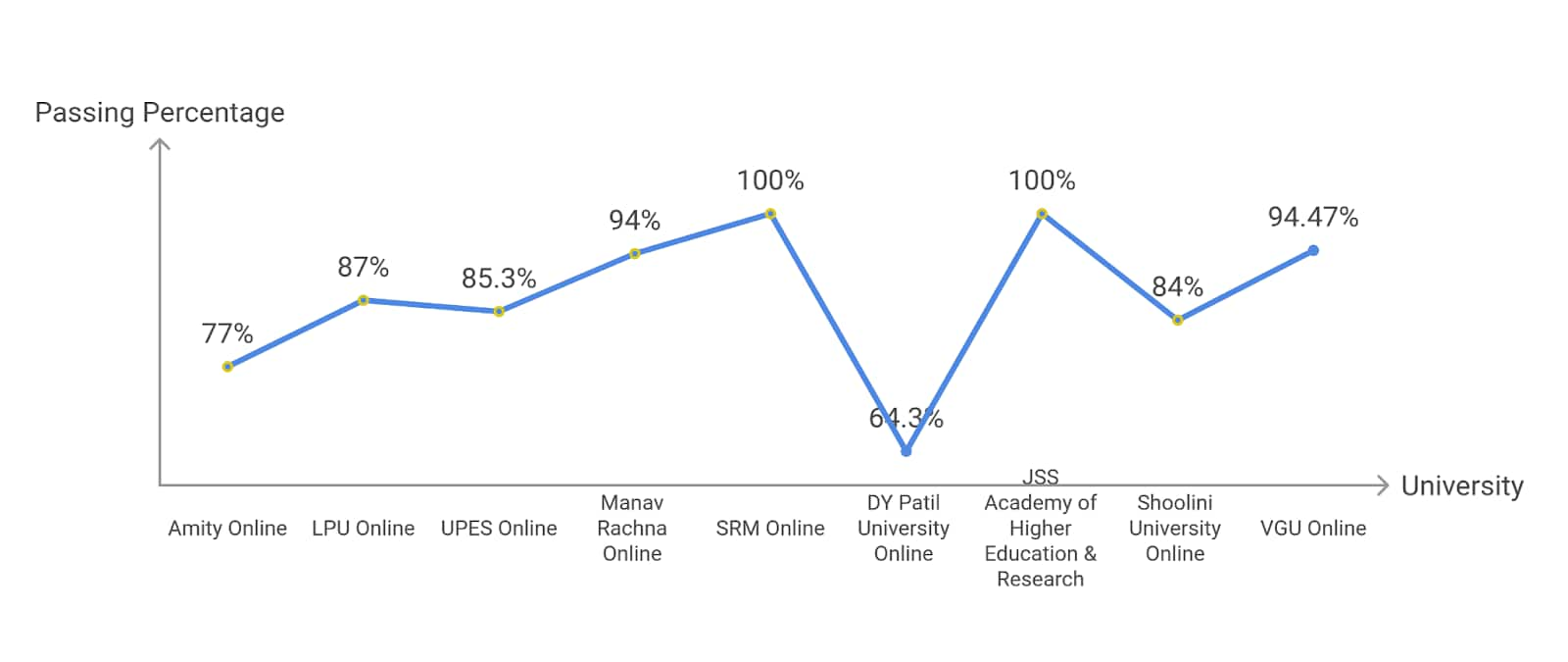IMI Bhubaneswar PGDM Admissions 2026
Phase 02 Applications Window Closing on 23rd January 2026 | 100% Placements Record | Highest CTC 40.31 LPA | Average CTC 12.74 LPA | Median CTC 12.48 LPA
Over the past three years, online MBA programmes had an intake capacity of 5 lakh, and enrolments stood at around 49,000. Admission trends, enrolment rates, and placements are shifting as these programmes gain popularity. However, online MBA degree intake does not always align with enrolment and placements, concerns are raised about market demand, student choices, and institutional benefits.
This Story also Contains

Online MBA is a two-year business management programme that provides students with advanced knowledge and skills in business and management principles. This online degree course covers key areas in finance, human resources, and business analytics. Popular career options after online MBA include human resource manager, management consultant, marketing manager, and project manager.
Several online MBA colleges in India have a high intake capacity, but actual enrolment depends on factors such as course recognition, credibility, and affordability. Placement outcomes are a major concern for online MBA aspirants. Analysing the enrolment, and placement trends helps students assess programme effectiveness, enabling them to make informed career decisions with confidence.
Phase 02 Applications Window Closing on 23rd January 2026 | 100% Placements Record | Highest CTC 40.31 LPA | Average CTC 12.74 LPA | Median CTC 12.48 LPA
NAAC A++ Grade | MBA program graded A** (National) by CRISIL | AACSB, ACBSP and BGA Member
Admission enrolment rates vary across institutes. It indicates the actual number of students joining a programme in a given year.

The table below highlights the comparison of admission enrolment figures and total student passing percentage for top online MBA colleges in India for the 2023-24 academic session:
| Colleges | Actual Enrolment | Total Passing Percentage |
|---|---|---|
22,831 | 77% | |
2,338 | 87% | |
1,345 | 85.3% | |
102 | 94% | |
2,554 | 100% | |
4,135 | 50.27% | |
3,570 | 64.3% | |
23 | 100% | |
1,513 | 84% | |
317 | 94.47% | |
313 | 82.7% |
The data highlighted above shows significant variations in enrolment numbers, student passing percentages, and placements across different institutions. Amity Online MBA stands out with the highest enrolment of 22,831 students, with 77 percent passing rate, and 1,051 students placed. Other universities also report strong academic performance, however, placement data is unavailable for many institutions.
Also Read: Is CAT Mandatory for Online MBA? Check Other Entrance Exams Required
A significant gap exists between male and female enrolment in top online MBA colleges in India for the 2023–24 academic session. The following table highlights the gender-wise enrolment in online MBA across colleges:
Colleges | Total Male Enrolment | Total Female Enrolment |
|---|---|---|
Amity Online | 13,558 | 9,273 |
LPU Online | 1,502 | 836 |
UPES Online | 1,141 | 204 |
Manav Rachna University Online | 59 | 43 |
SRM University Online | 2,335 | 1,866 |
Andhra University Online | 2,787 | 1,348 |
DY Patil University Online | 1,983 | 1,587 |
GLA University Online | 1,308 | 440 |
Guru Jambeshwar University | 103 | 58 |
JSS Academy of Higher Education & Research | 10 | 13 |
Shoolini University Online | 1,132 | 381 |
Vivekananda Global University Online | 214 | 103 |
Chitkara University Online | 183 | 130 |
Gender-wise enrolment trends indicate that most online MBA programmes have more male students than female students. While institutions such as Manav Rachna Online, JSS Academy and DYPU Online have relatively balanced enrolments, others show a significant gap. This disparity largely depends on career aspirations, industry preferences, personal choices, or accessibility challenges for female students.
Also Read: Top Government Colleges Offering Online MBA In India
The salary prospects for online MBA graduates in India vary significantly based on specialisation, industry demand, and skill relevance. The table below highlights the online MBA salary in India based on their specialisation:
Online MBA Specialisation | Average Online MBA Salary |
|---|---|
Rs 5.0 LPA | |
Rs 4.5 LPA | |
Rs 13.0 LPA | |
Rs 5.5 LPA | |
Rs 4.5 LPA | |
Rs 5.5 LPA | |
Rs 9.0 LPA | |
Rs 12.0 LPA | |
Rs 8.0 LPA | |
Rs 6 LPA |
Full-time MBA courses gain higher salaries owing to the prestige, credibility, and immersive campus learning of the programme. However, with the growing credibility of these courses and over 77 universities offering UGC-approved online MBA programmes in India. Several factors highlight a salary shift between online and full-time MBA courses, thus reducing the salary gap:
Online MBA students are gaining greater credibility in the salary scale due to their extensive practical experience in corporate settings, as most are working professionals. They develop real-time problem-solving skills, maintain discipline, and effectively manage their time, given the self-paced structure of these programmes.
Employer perceptions of online MBA programmes have changed significantly in recent years. With the rise of online education in recent times, employers now focus on candidates' skills, work experience, and ability to apply business knowledge rather than the format of the degree. With UGC-accredited institutions offering these online degree programmes, this bias is increasingly diminishing.
One significant advantage for online MBA students is the work experience they bring to the programme. Since most online MBA candidates are working professionals, they do not have to take a career break, which allows them to build experience while continuously upgrading their qualifications. This results in better career progression opportunities and secure promotions within their existing organisations.
Technological advancement in online MBA programmes has closed down the salary gap with full-time MBA graduates. This has thus led to skill development, networking, and employer recognition. As organisations value digital skills and real-world experience, online MBA graduates are becoming equally competitive for executive positions, reducing salary disparities with traditional MBA professionals.
Online MBA programmes are becoming a viable alternative to traditional MBA, offering industry-relevant skills and real-world experience to students. With enrolments increasing, and growing employer acceptance, online MBA courses are reshaping management education.
Frequently Asked Questions (FAQs)
Online MBA courses offer flexibility for working professionals, while offline MBA provides immersive networking and campus exposure. Ultimately, it depends on students’ career goals and preferences.
Online MBA opens opportunities in management, consulting, marketing, finance, HR, and business analytics, enabling career advancement in diverse industries globally.
Yes, online MBA programmes enhance skills, leadership abilities, and industry expertise, leading to career growth, promotions, and better salary prospects.
Online MBA programmes from accredited institutions are widely accepted and receptive if acquired from a UGC-approved university.
Students will be able to get a job at a top MNC after an online MBA as many multinational corporations value skills, experience, and accreditation, making online MBA graduates eligible for top roles.
On Question asked by student community
The Jain Entrance Test (JET) 2026 for MBA admissions at Jain University is a multi-stage process designed to evaluate candidates' aptitude, communication skills, and subject knowledge. The written exam syllabus typically includes sections on Mathematical Skills, Data Interpretation, Logical Reasoning, Language Comprehension, and General Knowledge. After the written test, qualifying
Hello,
Yes, after completing a bachelor’s in pharmacy, you are fully eligible to appear for the MAH MBA/MMS CET exam.
For Eligibility Criteria for MAH MBA/MMS CET 2026 you can access mentioned link below:
https://bschool.careers360.com/exams/mah-mba-cet
Hope it helps.
Hello,
The MBA finance course teaches a student about the principles of financial management, accounting, investment analysis, etc. One can get into banking, insurance, MNCs, etc, industries.
The CBSMS offers a 2 year MBA program, having both full time and part time options. It has a seat capacity of 180
Yes the application for MBA cet is started and application form is live now
with this percentile, you can get into tier 2 or tier 3 college, the list of the few notable college is given below-
1) FLAME university, Pune
2) AIMS institute, Bangalore
3) Doon business school, Dehradun
4) Christ university, Bangalore
5) NIT Trichy
6) KIIT school of management, Bhuvneshwar
Ranked among top 10 B-Schools in India by multiple publications | Top Recruiters-Google, MicKinsey, Amazon, BCG & many more.
Among top 100 Universities Globally in the Times Higher Education (THE) Interdisciplinary Science Rankings 2026
Last Date to Apply: 10th Feb | Globally Recognized by AACSB (US) & AMBA (UK) | 17.8 LPA Avg. CTC for PGPM 2025
Highest CTC 30 LPA | #9 in Management Category by Times B-School | Merit-Based Scholarship Upto - 50 Crores
Highest Package 27.25 LPA | Top 100 Average package 16.65 LPA | AACSB Accredited | Ranked 52 by QS International | Last Date to Apply: 27th Jan'26
#36 in NIRF, NAAC ‘A’ Grade | 100% Placement, up to 30% meritorious scholarships